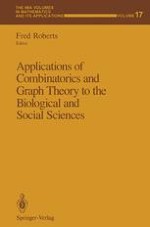1989 | OriginalPaper | Buchkapitel
Conceptual Scaling
verfasst von : Bernhard Ganter, Rudolf Wille
Erschienen in: Applications of Combinatorics and Graph Theory to the Biological and Social Sciences
Verlag: Springer US
Enthalten in: Professional Book Archive
Aktivieren Sie unsere intelligente Suche, um passende Fachinhalte oder Patente zu finden.
Wählen Sie Textabschnitte aus um mit Künstlicher Intelligenz passenden Patente zu finden. powered by
Markieren Sie Textabschnitte, um KI-gestützt weitere passende Inhalte zu finden. powered by
Scaling and measurement are usually based on numerical methods; this is, for instance, indicated by Stevens’ definition: “measurement is the assignment of numerals to objects or events according to rules” (see [15], p. 22), or by Torgerson’s statement: “measurement of a property involves the assignment of numbers to systems to represent that property” (see [16], p. 14). In contrast to this, conceptual scaling uses first of all set-theoretical methods to explore conceptual patterns in empirical data. Conceptual scaling has been developed in the frame of formal concept analysis, a theory based on a mathematization of conceptual hierarchies (see [18]). In this paper we give an introductory survey on conceptual scaling which concentrates on scales of ordinal type. First we recall basic notions and results of formal concept analysis and demonstrate them by an example (section 2). Then ideas of conceptual measurement are discussed in focussing on the question of measurability by standardized scales of ordinal type (section 3 and 4). These ideas are applied to the scaling of data contexts to derive conceptual hierarchies for the data (section 5). Finally, these scalings are used to introduce and to study a general notion of dependency between attributes which covers special notions like functional and linear dependency (section 6). Mathematically we presuppose some basic knowledge of order and lattice theory which can be found in [1] and [6].
